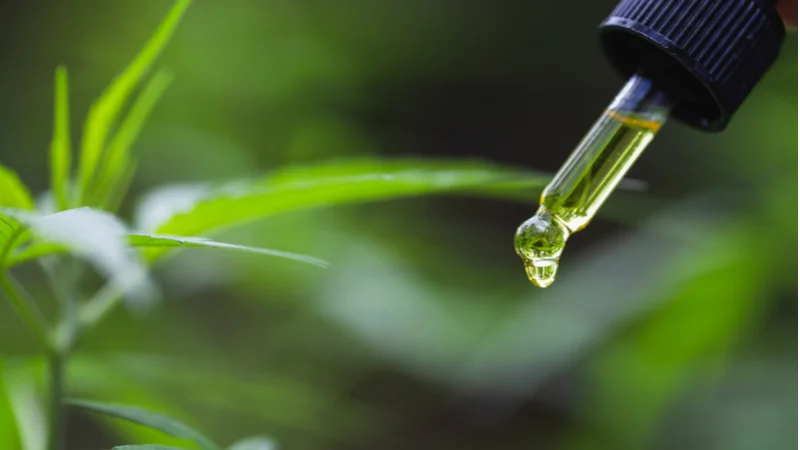Scientists have shown that an active ingredient of cannabis significantly upregulates autophagy, extending both lifespan and healthspan in C. elegans nematode worms.
Two of the most well-known components of marijuana are tetrahydrocannabinol (THC) and cannabidiol (CBD). They have the same atomic composition, but differ in structure and in some of their qualities. THC is what makes you high, while CBD can even dampen THC’s effect. Though both THC and CBD seem to have some beneficial qualities, THC is also responsible for the deleterious effects that heavy users might experience, such as mood swings, cognitive decline, and even changes in brain composition [2].
CBD, on the other hand, is considered benign and possesses antipsychotic, pro-cognitive, anti-inflammatory, anti-seizure, and antioxidant properties. In June 2018, the FDA approved Epidolex, the first CBD-based prescription medication, for rare forms of epilepsy, and later for the treatment of seizures associated with tuberous sclerosis complex (TSC). However, the research into both compounds is still in its infancy.
In this new study, scientists dived deeper into the workings of CBD using the nematode worm Caenorhabditis elegans (C. elegans), which is considered a good model for initial studies, including in geroscience. C. elegans was the first multi-cellular organism to have its lifespan extended by gene editing.
Increase in autophagy
Previous research has shown that CBD can increase lifespan in C. elegans and zebrafish [3], but the mechanism had remained unknown. Another study found that CBD induces autophagy in cultured neuronal cells [4]. In this new study, the researchers attempted to investigate the relationship between these two effects.
Autophagy is the process of clearing away various cellular debris, such as misfolded proteins and dysfunctional organelles. Unsurprisingly, this maintenance system appears to be very important for health and longevity in numerous model organisms and in humans.
The CBD treatment greatly increased autophagic activity in several tissues and cell types, most drastically in neurons (by 78%). The researchers then validated those findings in vitro on several types of cells, including mouse primary hippocampal neurons. Importantly, impaired autophagy in the brain is considered a major cause of Alzheimer’s disease [5].
Autophagy is a complex process that can be crippled at several stages. Autophagic flux is a specific measure of how fast the unwanted molecular stuff is being degraded, and it quantifies overall “autophagic health”. In the experiments, CBD drastically increased autophagic flux both in vivo and in vitro.
Long live the worm
Worms on CBD also lived significantly longer than controls. However, numerous compounds and interventions have been shown to increase the short lifespan of C. elegans by much larger margins. Still, a significant lifespan increase is a good indication that the treatment made the worms healthier.
The researchers also measured the worms’ healthspan. Many interventions that prolong lifespan in C. elegans often lead to functional impairment, such as decreased motility. Three popular health metrics in C. elegans that decline with age are pharyngeal pumping rate, reproductive capacity, and locomotion, and all three were significantly restored, rather than impaired, by CBD treatment.
With age, neurons in C. elegans undergo morphological changes, acquiring irregular shape. The CBD treatment was able to mitigate the number of irregularly shaped neurons, though not to youthful levels. CBD also led to an increase in neurite length and spine density, two metrics of neuronal health, in mouse neurons.
To determine whether the increase in lifespan was due to more autophagic activity, the researchers knocked out three different autophagy-related genes, sqst-1, vps-34, and bec-1, using RNA interference. In two of the cases, the knockout shortened the worms’ lifespan, and in all three cases, subsequent CBD treatment failed to extend it, confirming that autophagy is essential for CBD-mediated increase in lifespan.
SIRT1’s ortholog mediates the effect
The gene SIRT1 has been a popular object of study in geroscience. One of its roles is a mediator of autophagy [6]. In C. elegans, there is no gene homologous (identical) to SIRT1, but there is an ortholog – a gene with a different sequence but a similar function – called sir-2.1. The knockout of sir-2.1 mostly blocked the beneficial effects of CBD on autophagy and on neuronal morphology. Mice, on the other hand, do have their own SIRT1 gene, and its knockout in mouse neurons also obliterated many benefits of CBD, pointing at a crucial role of SIRT1 in mediating CBD-induced effects.
Conclusion
Its origin aside, CBD is an intriguing compound that might have numerous beneficial qualities. This study expands our understanding of CBD’s effects, linking them to autophagy, an important process that keeps popping up on geroscientists’ radars. It is encouraging that CBD demonstrates the strongest pro-autophagy effect in neurons, making it a potential anti-Alzheimer’s drug. Obviously, the fact that CBD increases autophagy in worms does not mean that smoking weed makes humans healthier. Our advice would be to wait for human trials before attempting to receive related effects from CBD products.
Literature
[1] Wang, Z., Zheng, P., Chen, X., Xie, Y., Weston-Green, K., Solowij, N., … & Huang, X. F. (2022). Cannabidiol induces autophagy and improves neuronal health associated with SIRT1 mediated longevity. GeroScience, 1-20.
[2] Sohn, E. (2019). Weighing the dangers of cannabis. Nature, 572(7771), S16-S16.
[3] Pandelides, Z., Thornton, C., Faruque, A. S., Whitehead, A. P., Willett, K. L., & Ashpole, N. M. (2020). Developmental exposure to cannabidiol (CBD) alters longevity and health span of zebrafish (Danio rerio). Geroscience, 42(2), 785-800.
[4] Vrechi, T. A., Leão, A. H., Morais, I., Abílio, V. C., Zuardi, A. W., Hallak, J. E. C., … & Pereira, G. J. (2021). Cannabidiol induces autophagy via ERK1/2 activation in neural cells. Scientific reports, 11(1), 1-13.
[5] Liu, J., & Li, L. (2019). Targeting autophagy for the treatment of Alzheimer’s disease: challenges and opportunities. Frontiers in molecular neuroscience, 203.
[6] Xu, C., Wang, L., Fozouni, P., Evjen, G., Chandra, V., Jiang, J., … & Berger, S. L. (2020). SIRT1 is downregulated by autophagy in senescence and ageing. Nature cell biology, 22(10), 1170-1179.




